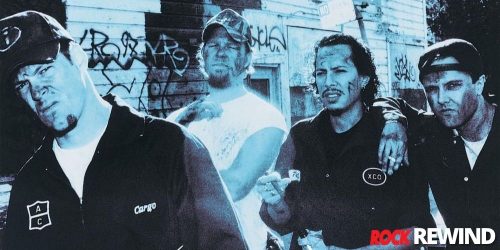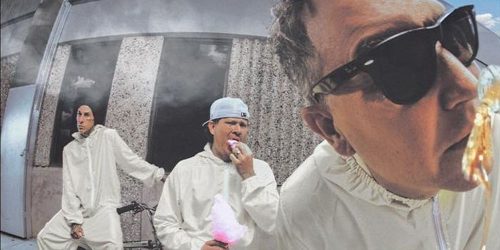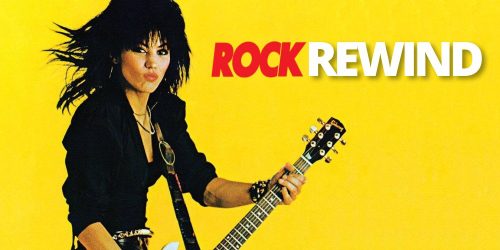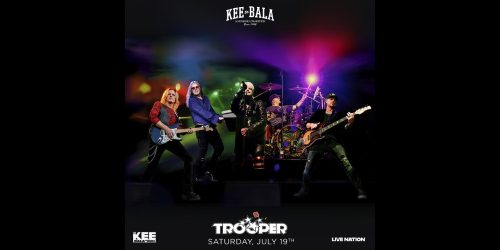Rock Rewind: Why Queen Continues To Inspire Fans Today
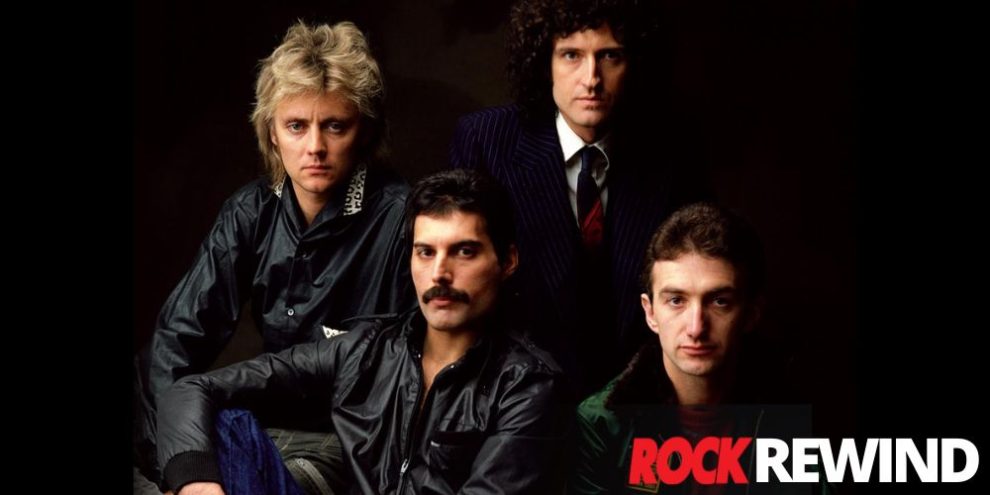
Queen brought together different genres and styles to create unimaginable sounds. This was largely thanks to the band’s incredible lineup of musicians with very eclectic tastes.
From progressive rock and heavy metal to glam rock with operatic sounds, Queen always delivered an unexpected experience. One that was full of camp and bombast. It’s what made them one of the most iconic and versatile bands to come out of the 1970s.
Even today, they have a huge fan base, influence artists in many genres and hold a special place in the hearts of the LGBTQ+ community.
While the band started in London in the 1970s, they would soon see their music gain success worldwide. Here’s a look at their story …
Jump To:
Founding | Discography | After Made In Heaven | Influence On LGBTQ+ Community
How Queen Got Their Name
Queen originally started as the band Smile. But in 1970, when Mercury came on as lead vocalist, he suggested the band change their name to Queen.
In an interview with Melody Maker, Mercury shared, “The concept of Queen is to be regal and majestic … We want to be dandy. We want to shock and be outrageous.”
FUN FACT: Queen's infamous logo was created by Freddie Mercury and combines the each of their astrological signs – two lions for Deacon and Taylor who were born in Leo, a crab for May who was born in Cancer and two winged maidens/fairies for Mercury who was a Virgo.
At first, the other band members were unsure. Taylor recalls:
“The name was Mercury’s idea … It was just a reflection of the social world we were in at the time, when he and I were working together on Kensington Market. In those days there was a pretty eccentric crowd there, and a lot of them were gay and a lot of them pretended to be, and it just seemed to fit in.
I didn’t like the name originally and neither did Brian, but we got used to it. We thought that once we’d got established the music would then become the identity more than the name…”
Ken Testi, a friend of the band, remembers the first time he heard the name. “I said, ‘You’ll never get away with that, Fred.’ But he was like, ‘No, it’s wonderful, dear, people will love it.’”
And he was right …
The Founding Of Queen: It All Started With Smile
In 1968, Brian May (guitar) and Tim Staffell (vocals) formed the band Smile. They were also joined by Chris Smith on Keyboard.
This wasn’t their first foray into music, having worked together before in a band called 1984.
After posting an ad for a drummer, Roger Taylor joined the band later the same year. In 1969, Smith left the group and Smile became a trio.
At the time, Staffell was attending Ealing Art College. Here he met Mercury Bulsara (later Freddie Mercury). Mercury was a fan of Smile and often made suggestions to the band. He wanted them to experiment with showmanship and recording.
FUN FACT: Freddie Mercury and Staffell weren't the only members of Queen who graduated from post secondary. Roger Taylor had a Bachelor of Science, Deacon had a degree in Electrical Engineering, and Brian May had a PhD degree in astrophysics.
In 1970, Staffell left Smile to join Humpy Bong. Mercury took his place in Smile. Taylor’s friend Mike Grose also joined on bass.
It was around this time that Mercury suggested they change the band name. It was also when Mercury changed his last name from Bulsara to Mercury.
Brian May remembers, “Mercury had written this song called “My Fairy King” … ‘And there’s a line in it that says, ‘Oh Mother Mercury what have you done to me?’ And it was after that that he said, ‘I am going to become Mercury as the mother in this song is my mother.’”
May continues, “Changing his name was part of him assuming this different skin … The young Bulsara was still there but for the public he was going to be this god.”
RELATED: The history of AC/DC from High Voltage to Power Up ...
Bassists Come And Go In A Short Time
Queen’s first live show was on July 18, 1970 at Imperial College. Brian May remembers the show well. When accepting an award from the Performing Rights Society for Music in 2013, he recalls:
"The first proper gig we did was at Imperial College in the Union Hall. I remember it very distinctly because I'd seen all sorts of people playing in there.
I'd been part of the Entertainment Committee [as a student] and we booked a group every Saturday night in those days. People like Spooky Tooth and Steamhammer! We booked Jimi Hendrix too. So for us it was a dream come true to actually play on that stage. It used to get packed in there, so it was a major stepping stone for us."
The band did two more gigs before Mike Grose left. He eventually took over his father’s haulage company. The same company later helped Queen transport their equipment.
Barry Mitchell replaced Grosse on bass. Mitchell played 12 gigs before Doug Bogie replaced him.
Mitchell explains in a 2018 interview,
“The music wasn't my kind of music. I didn't see it progressing, which in hindsight looks foolish, but they weren't the band that they became.
Mercury at the time didn't have great command of his voice. His singing was a bit off and a bit squeaky sometimes. Roger has famously described Mercury's voice as sounding like a strangled sheep. He hadn't gotten control of his voice.
Brian's obviously a great guitar player. Roger's a superb drummer. For me, I saw Mercury as their weak link then, but you couldn't have foreseen what happened. He developed his voice, he got his technique right, and we all know what his voice ended up as. But it wasn't like that at the start.”
The band fired Bogie after two gigs with Queen. May once shared, “He jumped up and down in a manner most incongruous.”
Bogie corroborates in a biography of the band years later, “I thought I’d done really well. These guys were older but I had energy and I was leaping about… Unfortunately, no one told me that what Mercury wanted was a quiet thumper at the back.”
He describes the post show conversation as the “I don’t want to do this anymore – we’re breaking up discussion.”
Bogie explains:
"I thought that we had played two excellent and exciting gigs. However, in the back of the borrowed van after the Yes gig at Kingston Polytechnic, there was one of those taking everything apart discussions: 'so everything is terrible', 'it's a waste of time', and Mercury announces he doesn’t want to continue.
So, as the new boy who knows nothing of their past activities and relationships, I just accept that that is the end of the experiment! A shame, but not unusual with bands with creative members."
Four months passed without any shows.
Queen Is Born
In 1971, John Deacon became drummer for Queen. On July 2 that same year, the band played their first show with the classic Queen line up:
- Freddie Mercury on lead vocals
- Brian May on guitar
- John Deacon on bass
- Roger Taylor on drums
Their photographer, Neal Peston, once shared his opinion of each member with Songfacts:
“Roger was the rock star, with the looks, the talent, the clothes.
Mercury was a bit more soft spoken off stage than you'd think, but he always had the swagger that came with being Freddie Mercury. He loved the camera.
John seemed to have eyes in the back of his head - he'd always be aware of everything going on but wouldn't necessarily talk about it. Then all of a sudden, a zinger would come out of his mouth.
Brian, at first, seemed a bit aloof to me but I came to realize that he's just not a boisterous guy. He's pensive, brilliant, and he understands what it truly means to be a fan.”
Later in 1971, Queen recorded their first 5 song demo. May had struck a deal with a contact he knew from his Smile days. The band could record demos at a new De Lane Lea Studios’ property. In exchange they would help the studio test their new equipment.
The songs they recorded were:
- “Keep Yourself Alive”
- “Jesus”
- “The Night Comes Down”
- “Liar”
- “Great King Rat”
Queen’s demo album didn’t garner much interest from recording companies. Charisma Records showed interest but Queen declined their offer. In the book Is This the Real Life?, a friend of the band recalled Queen’s thoughts on the offer:
“Queen’s view was that if they signed with Charisma, they would always play second fiddle to Genesis and those other bands, which was very forward thinking of them”
– Ken Testi
In 1972, the band finally got a break. Two producers, John Anthony and Roy Thomas Baker, had seen the band recording their demo at De Lane Lea. They liked what they saw and recommended the band to the founders of Trident Studio.
Queen entered into a management deal with a subsidiary of Trident Studios. Trident oversaw the band’s management. Queen was also able to use their hi-tech recording studios for free during off-peak hours.
This would start them on their path to becoming one of the most iconic rock bands of all time.
Queen Discography
Since their conception, Queen has put out:
10 live albums – Live Killers (1979), Live Magic (1986), At the Beeb (1989) (later released in the USA as Queen at the BBC in 1995), Live at Wembley ‘86 (1992), Queen on Fire – Live at the Bowl (2004), Queen Rock Montreal (2007), , Hungarian Rhapsody: Queen Live in Budapest (2012), Live at the Rainbow ‘74 (2014), A Night at the Odeon – Hammersmith 1975 (2015), On Air (2016),
There were 2 additional live albums in collaboration with other singers – Queen + Paul Rodgers: Return of the Champions (2008), Queen + Lambert: Live Around the World (2020)
15 compilation albums – Greatest Hits (1981), Greatest Hits II (1991), Classic Queen (1992), The 12” Collection (1992), Queen Rocks (1997), Greatest Hits III (1999), Stone Cold Classics (2006), The A–Z of Queen, Volume 1 (2007), Absolute Greatest (2009), Deep Cuts, Volume 1 (1973–1976) (2011), Deep Cuts, Volume 2 (1977–1982) (2011), Deep Cuts, Volume 3 (1984–1995) (2011), Icon (2013), Queen Forever (2014), Greatest Hits in Japan (2020)
2 soundtrack albums – Flash Gordon (1980); Bohemian Rhapsody: The Original Soundtrack (2018)
They’ve also released 15 studio albums plus a collaboration between Queen and Paul Rodgers..
1. Queen (1973)
During their 1972 recording sessions at Trident Studios, Queen worked with Baker and Anthony to produce their debut album. But it wasn’t until the following year they found a record company to release it.
In 1973, the band signed on with two labels. EMI Records in the UK and Elektra in the US released Queen’s self-titled debut album that year.
“I knew in my bones they were it … that Queen would thrive at Elektra and we were the perfect label for them…It took a while before their stage act dazzled — they grew into that — but the records were powerful and inventive from the first…The group dynamic was excellent: they liked and respected each other. Each member of Queen was brilliant, and you have no idea how much that excites me. The relationship ripens and deepens when you can talk to the guitarist about celestial mechanics.”
– Jac Holzman, Elektra’s founder
The band’s sound became more radio friendly in future years. But their debut album had a progressive hard rock and heavy metal sound.
The album included songs written by Mercury, May and Taylor. It also includes “Doing All Right”, which was written by Staffell and May during their Smile Days. The version of “The Night Comes Down” was the original demo recording with a different mix.
Critics received the album well but the album was not a commercial success. “Keep Yourself Alive”, which they released as a single a week before the album, also sold poorly.
“There’s no doubt that this funky, energetic English quartet has all the tools they’ll need to lay claim to the Zep’s abdicated heavy-metal throne, and beyond that to become a truly influential force in the rock world. Their debut album is superb.”
– Gordon Fletcher, Rolling Stone reviewer
Later that year, Queen went on tour for the first time with Mott The Hoople.
2. Queen II (1974)
Early in 1974, Queen released the single “Seven Seas of Rhye”. They previously released the song on Queen as a short instrumental. But the full version was released as a single and included in Queen II . It was their first song to reach No. 10 on the UK charts.
The band released Queen II later that year. Produced by Baker and Robin Geoffrey Cables, the album showed growth since their previous release. It was the first hint of what would be their signature sound. It introduced more multi-layered guitar, vocal harmonies and new musical styles, including art rock and glam rock.
In an interview with Melody Maker, Queen explained that the album's theme was “good versus evil.” While many called it a concept album, this was not the case.
Mercury explains in an 1976 interview with Sounds, "it just evolved to where there was a batch of songs that could be considered aggressive, or a Black Side, and there was a smoother side."
Overall the album was more elaborate, with many saying the production was over the top production.
"This is it, the dregs of glam rock. Weak and over-produced, if this band are our brightest hope for the future, then we are committing rock and roll suicide."
– Record Mirror
Still, the album was successful in the UK, charting at No. 5. In the US it was No. 49, which was an improvement from their debut album at No. 83.
3. Sheer Heart Attack (1974)
Before their next album release, Queen released the double A-side single “Killer Queen/Flick of the Wrist”. In New Musical Express, Freddie Mercury explained that the song is “about a high class call girl. I'm trying to say that classy people can be whores as well. That's what the song is about, though I'd prefer people to put their interpretation upon it – to read into it what they like."
“Killer Queen” charted at No. 2 in the UK and was the first song to chart outside their native country. In the US, the song charted at No. 12. Mercury also received his first Ivor Novello Songwriter Award for the song in 1975.
Sheer Heart Attack was a transition album for Queen. It had more glam and pop rock sounds and mainstream tracks than previous albums. It also brought the band even closer to the sound they would become known for.
Sheer Heart Attack reached No. 2 in the UK and No. 12 in the US. Like past albume, it had mixed reviews but was mostly well received by critics.
"Sheer Heart Attack not only improves on every aspect of their sound suggested by the first two records, but delivers some of the finest music of their career ... this is the band at the height of its powers."
– Pitchfork
The album preceded a sell-out tour of the United States.
4. A Night at the Opera (1975)
After failing to receive most of the money earned from their past albums, Queen hired a lawyer to help get out of their Trident agreement. They eventually left and signed a management contract with John Reid.
At the time it was produced, A Night at the Opera was the most expensive album ever made. But it paid off with the album becoming the band’s first platinum-certified album in the US. It reached No. 1 in the UK and No. 4 in the US.
"You can feel the colossal effort that went into every second of this long album – and yet there's hardly a moment when I would criticise it for being contrived or overproduced."
– Sounds
“Bohemian Rhapsody” Almost Wasn’t Released
One of the top performing songs on the album was “Bohemian Rhapsody”. When Queen produced it, they wanted it to be the lead single for the album. But due to its almost 6 minute length, their new manager said they would have to edit it first.
Leslie-Ann Jones biography Mercury says:
“EMI and the industry in general voiced misgivings. Radio stations wondered what the hell they were supposed to do with a six-minute single. Even bassist John Deacon expressed his fears, albeit in private, that to release ‘Bohemian Rhapsody’ would prove the greatest error of judgment of Queen’s career.”
This changed once Kenny Everett, a BBC DJ, played the song 14 times on his show, forcing the label to release it.
Bohemian Rhapsody ended up at No. 1 in the UK for 9 weeks and it’s the third biggest selling single in the UK of all time. In the US, the song was No. 9 on the Billboard Top 40 charts.
The song again charted at No. 2 in 1992 following the release of Wayne’s World, and again in 2018 after release of the band’s biopic. Freddie Mercury received an Ivor Novello Award for ‘Bohemian Rhapsody’.
There’s a great amount of speculation on what the meaning behind the song’s lyrics. Some believe it has to do with Mercury’s sexuality and others point to his childhood.
In Mercury’s own words, "It's one of those songs which has such a fantasy feel about it. I think people should just listen to it, think about it, and then make up their own minds as to what it says to them."
5. A Day at the Races (1976)
A Day at the Races was the first album produced without Roy Thomas Baker. Instead, Queen self-produced. The album took 16 weeks to record, which was the longest any of Queen’s albums had taken to date.
The band completed the lead single, “Somebody To Love”, just 3 weeks before its release. It reached No. 2 in the UK and No. 13 in the US.
Less than a month later, the album was released and charted No. 1 in the UK and No. 5 in the US. Like their early releases, the album received mixed reviews:
“Races is a reconfirmation of Queen's position as the best of the third wave of English rock groups."
– Winnipeg Free Press
"With A Day at the Races, they've deserted art-rock entirely. They're silly now. And wondrously shameless."
– Circus
6. News of the World (1977)
Queen produced News of the World with their engineer Mike Stone. Stone had been working with them since their debut album.
Fans see News of the World as another transition album for the band. Queen went back to a more mainstream and minimalist hard rock sound with this album. This served them well as punk rock popularity grew.
In an interview with The Quietus, May explains:
“We'd already made a decision that...[after] A Night at the Opera and A Day at the Races, we wanted to go back to basics for News of the World. But it was very timely because the world was looking at punk and things being very stripped down. So in a sense we were conscious, but it was part of our evolution anyway.”
The single “We Are The Champions”, which was released with B side “We Will Rock You”, reached No. 2 in the UK and No. 4 in the US.
The album News of the World released 3 weeks later and reached No. 3 in the US and went 4x Platinum. In the UK it charted at No. 4.
"Queen stripped down to almost basics...it's not a bad album by any means, but it could have been better."
– Record Mirror
7. Jazz (1978)
Following the release of News of the World, Queen ended their contract with John Reid. They instead started their own management structure. Baker returned to produce the album.
The band headed to Nice, France to start recording the album. The choice to record here was due to the hefty taxes they were paying on royalties on previous albums. In the documentary Days of our Lives, Taylor says the taxes were as much as 98%.
While there, they attended the Montreux Jazz Festival in Spain. It ‘s believed the festival was the inspiration for the album. They finished recording at Mountain Studios in Montreux, which Mercury bought out the following year.
The band released “Bicycle Race” and “Fat Bottomed Girls” as a double A-side single from the album. “Bicycle Race” was inspired by the 1978 Tour de France that the band also attended. It reached No. 11 in the UK and No. 24 in the US.
The album Jazz came out in November 1978. It reached No. 2 in the UK and No. 6 in the US.
Following its release, the single “Don’t Stop Me Now” came out. Though it performed well in the UK at No. 9, it only reached No. 86 in the US.
8. The Game (1980)
While many believed Queen had used a synthesizer while recording previous albums, this was not the case. It wasn’t until The Game, that the band started using one.
The Game was the only album to reach No. 1 in the US and became their best selling US album. It also reached No. 1 in the UK. Even still, the album received mixed reviews.
Before its release, the band had released 3 singles from the album.
“Crazy Little Thing Called Love” reached No. 2 in the UK and No. 1 in the US. The other two singles, “Save Me” and “Play the Game”, were less successful. They ranked No. 11 and No. 14 in the UK and “Play the Game” ranked No. 42 in the US.
Queen came back with their release of the song “Another One Bites The Dust” following the album release. It charted at No. 1 in the US and No. 7 in the UK.
9. Flash Gordon (1980)
Flash Gordon was originally a soundtrack for the movie of the same name. However, Queen decided to release it as an album. It charted No. 10 in the UK and No. 23 in the US.
They picked up the project while recording The Game. May later explained that Queen was intrigued by the idea of bringing rock to a genre that largely depended on orchestra music.
They were also excited by the fact that they would be writing original songs as well as the score.
In an interview with Guitar Great, May recalls:
"It was in our minds that we would be up for writing a soundtrack if the right one came along. We'd been offered a few, but most of them were where the film is written around music, and that's been done to death – it's the cliché of 'movie star appears in movie about movie stars.
We would be writing a film score in the way anyone else writes a film score, which is basically background music, but can obviously help the film if it's strong enough.
That was the attraction, because we thought that a rock group hadn't done that kind of thing before, and it was an opportunity to write real film music. So we were writing to a discipline for the first time ever, and the only criterion for success was whether or not it worked with and helped the film, and we weren't our own bosses for a change.”
10. Hot Space (1982)
In 1981, Queen collaborated with David Bowie on “Under Pressure”. The collaboration was unplanned - Queen was having a jam session at their studio in Switzerland when Bowie decided to join in.
Originally released as a single in October 1981, "Under Pressure" was later included on Queen's 1982 album Hot Space. When released as a single, “Under Pressure” reached No. 1 in the UK and No. 29 in the US.
“Body Language” from Hot Space was also released as a single before the album. It charted No. 11 in the US but only reached No. 25 in the UK.
The Hot Space album was a change from previous works. It continued to include pop rock but also introduced more disco, funk, R&B, and dance elements. The band also introduced a drum machine.
After the release of Hot Space, Queen played their last concert in the United States with Mercury, as the popularity had declined. This was clear in the charting of Hot Space, which only made it to No. 22 in the US. In the UK, it charted No. 4.
“The band that once proudly proclaimed not to use synthesizers on their albums has suddenly, dramatically reversed course, devoting the entire first side of the album to robotic, new wave dance-pop, all driven by drum machines and colored by keyboards, with Brian May's guitar coming in as flavor only on occasion.”
– AllMusic
Why Queen Changed Up Their Sound For Hot Space
Taylor talked about the massive change of direction in an interview with Jim Ladd.
"It was really John. "John’s always been R&B orientated, our bass player who wrote ‘Another One Bites The Dust’, ... which turned out to be the biggest selling record of the year. And I think that was the song that catapulted us into taking that road. I think we went too far and did too much. ... Everybody in the band feels that way now."
The band also blamed Paul Prenter for his influence on the album. Prenter was Mercury’s manager from 1977 to 1984, as well as sexual partner for a time.
Mark Blake wrote the book Freddie Mercury: A Kind Of Magic. In the book, Reinhold Mackone, one of the band's producers, talks about Prenter. He explains that Prenter hated rock music and was constantly in Mercury’s ear. He also refused to let US stations speak to Mercury.
May shares in the same book, “This guy, in the course of one tour, told every record station to fuck off. But not just ‘f*ck off, but ‘Mercury says, ‘f*ck off’."
Paul Prenter would not be fired by Mercury until 1986. In the movie, Bohemian Rhapsody, he’s fired because he didn’t tell the band about the Live Aid concert. Following his termination, Prenter sold a story to The Sun. The story revealed information about his relationship with Mercury, his disease and his past affairs with other men.
11. The Works (1984)
After their Hot Space tour, the band took a break. Each member worked on their own projects during this time. In August of the following year, the band got back together to work on their next album.
While composing the album, Queen was offered the opportunity to do a soundtrack for The Hotel New Hampshire. But the soundtrack was taking too much of their attention and they soon dropped the project. “Keep Passing the Open Windows” was the only song they wrote for the film and appeared on The Works.
The Works was Queen’s first album after moving from Elektra to Capitol Records in the US. The album moved back to their original rock sound. But there were still nods to 80s retro electronic music and funk.
While the album did not reach No. 1 in the UK, it spent 94 weeks on the charts. This was the longest time for any Queen album. In the US, Queen was quickly losing their top chart positions, with The Works coming in at 23.
At the time of release, the album was fairly well received:
“The Works is a royal feast of hard rock without that awful metallic aftertaste; as such, it might turn out to be the Led Zeppelin II of the Eighties.”
– Rolling Stone
12. A Kind of Magic (1986)
Prior to the release of their next album, Queen was invited to perform at Live Aid by Bob Geldof and Midge Ure of The Boomtown Rats. The concert was organized to raise money for those starving in Africa. Sting, U2, The Who, David Bowie and Elton John were just some of the many performers.
May recalls, “We definitely hesitated about doing Live Aid.” But Queen accepted and it was one of their most memorable performances.
“Queen smoked ’em. They just took everybody. They walked away being the greatest band you’d ever seen in your life, and it was unbelievable. And that’s what made the band so great; that’s why they should be recognized as one of the greatest rock bands of all time, because they could connect with an audience.”
– Dave Grohl of Foo Fighters
Two months later, the band began work on their next album. A Kind of Magic went straight to No. 1 in the UK and 100,000 copies were sold in the first week. It was also the first Queen album to be digitally recorded.
The album has been dubbed the unofficial Highlander soundtrack with 6 out of 9 of the songs being featured in the film. The album also had 4 hit singles in the UK. “A Kind of Magic” was a favourite and reached No. 3 in the UK but only reached No. 42 in the US.
13. The Miracle (1989)
This was the first album released after Mercury’s HIV diagnosis in 1987, though he did not share it with the public.
Originally the album was supposed to be called “The Invisible Men” but the title was changed shortly before release. It charted No. 1 in the UK and No. 24 in the US.
The single “I Want It All” reached No. 3 in the UK and US. The remaining singles from the album did not chart in the US. This included “Breakthru”, “Invisible Man”, “Scandal” and “The Miracle”.
"The Miracle is a showcase for Freddie Mercury and his love of sweeping, quasi-operatic vocals. And indeed, Mercury – especially on the title track – has never sounded better... Only on a few tracks ("Khashoggi's Ship" and "Was It All Worth It") does May really let it rip, and when he does, it's like the old Queen peeping out for just a moment and then turning tail... At least The Miracle offers little snippets of Queen's former majesty."
– Rolling Stone
Less than a year later, Queen received their ‘Outstanding Contribution to British Music’ at the Brit Awards.
14. The Innuendo (1991)
After recording The Miracle, Queen took a break from touring.
Mercury explained in an interview with BBC Radio 1 that the band wanted a break from their “album-tour-album-tour” routine.
The Innuendo was the band’s last album with Freddie Mercury. It was also the first to be released under Hollywood Records in the US, which Disney owned. The deal included rights to their earlier works through Elektra and Capitol. These albums were reissued starting in 1991 and going forward.
While the album did not chart at No. 1 in the US, it was the first album since The Works to go Gold. In the UK, it ranked No. 1.
Two singles reached No. 1 in the UK. This included “Innuendo” and “These Are The Days Of Our Lives”.
15. Made in Heaven (1995)
Made in Heaven was the first album the band released without Mercury. May, Taylor and Deacon, used vocals that Mercury had recorded before his passing in 1991. Mercury had intentionally recorded as many vocals as he could with instruction for the band to complete the songs later.
Their producer at the time, David Richard, shared in the documentary Champions of the World:
“The thing that was really unusual about these last songs they recorded was that Mercury insisted on doing final vocals. Normally he had always wanted to wait until all the music was completed before he would put his final vocal on. There must have been a reason for this, I think he felt there wasn’t enough time to have it completed in time. Which also means that he definitely wanted these things to be released, there’s simply no other reason why he would have done that.”
The album went quadruple platinum in the UK and charted at No. 1.
“Ten new tracks (and one reprise). No filler. No shame. An essential purchase for Queen fans, certainly, but even without its special significance, Made in Heaven is probably a better album than Innuendo and a fitting swan song by one of the most incandescent groups in rock. Made in Heaven is also the last musical will and testament of a star who was never going to be turned into a saint, but whose grandstanding performances were, right to the very end, always marked by reckless enthusiasm and a rare generosity of spirit."
– Q Magazine
After Made In Heaven
Two years after the album, Deacon retired from the band. In 1998, the remaining members released a single titled “No One But You”. The song was inspired by Princess Diana’s death and was dedicated to Mercury. After that, the band was inactive until 2004, though compilation albums were released.
The band was inducted into the Rock and Roll Hall of Fame in 2001. In 2002, the band received a star on the Hollywood Walk of Fame. And in 2003, May and Taylor got together to perform at a concert. The show was organized by Nelson Mandela to raise awareness for AIDs. Queen was also the first band inducted into the Songwriter Hall of Fame the same year.
In 2004, the band was inducted into the UK Music Hall of Fame. May and Taylor also began touring with Paul Rodgers. The billing was Queen + Paul Rodgers to emphasize that the singer was not replacing Mercury. Three years later, they released “Say It's Not True” as a single, followed by the 2008 album release of Queen + Paul Rodgers The Cosmos Rocks.
In 2010, May and Taylor left EMI Records and signed with Island Records. The following year, they performed with Adam Lambert at the MTV Europe Music Awards, where they received the Global Icon Award.
Taylor shares how Queen ended up working with Lambert. “A friend of mine called me up and said, ‘I’ve just seen the most amazing singer on American Idol.’ I checked it out and [Lambert] was singing 'Whole Lotta Love' by Led Zeppelin and just blowing it away. Fantastic.”
The band was so impressed that they contacted American Idol about the singer.
Taylor goes on to explain that after they contacted American Idol, they were asked to perform the finale with the two finalists.
This led to more performances and tours with Adam Lambert on vocals. Queen + Adam Lambert continued until their last tour, which ended in early 2020.
Freddie Mercury’s Influence On The LGBTQ+ Community
Most people can’t think about Queen without thinking of their legendary frontman Freddie Mercury.
While Mercury never came out publicly, he didn’t hide his sexuality and was often described as flamboyant and camp. He was a symbol of androgyny in rock, blurring the lines of gender. Though he wasn’t alone.
Boy George wore makeup. Prince killed it in a pair of heels. Mick Jagger wore ruffles and skirts. Annie Lennox had cropped hair and suits. Little Richard. David Bowie. Elton John. Marilyn Manson. Patti Smith. KISS. The list of androgynous musicians goes on.
In an interview with Rolling Stone, Jagger shares that he believes androgyny in rock started as early as Elvis Presley.
“Elvis was very androgynous. People in the older generation were afraid of Elvis because of this. That was one of the things they saw in Elvis. They called it effeminate. And they saw it straight away.”
Whether you agree with this or not, androgyny has been alive in rock and roll for years. And Mercury never shied away from it with angel wing cloaks, sequin bodysuits, nail polish, masks and a love for theatre. In a 1973 interview, he explained:
“We’re confident people will take to us, because although the camp image has already been established by people like Bowie and (Marc) Bolan, we are taking it to another level. The concept of Queen is to be regal and majestic. Glamour is a part of us and we want to be dandy. We want to shock and be outrageous instantly.”
Mercury and other artist’s gender-bending was an inspiration for the LGBTQ+ community. Even today, the LGBTQ+ community finds inspiration in Mercury’s androgyny.
“Seeing him express his androgyny in such an assertive and free way, something changed in me. I began to feel more comfortable in myself in terms of allowing myself to express myself in a more androgynous way, and this was the start of me accepting the fact that I was also gay.”
– Mikah Muir, Just Like Us Ambassador
Mercury’s Fight With HIV/AIDS
In 1959, the first known case of HIV in a human was recorded. By the late 1970s and early 1980s it was spreading through the US, UK and other countries.
At the time, leaders were denying the realities of HIV and AIDs. There was also a huge misconception that it was a “gay disease” or “gay plague”. This was because gay men were one of the main groups afflicted by the virus. This led to discrimination against the LGBTQ+ community that still persists today.
It wasn’t until the late 1980s that the terms HIV and AIDS became more commonplace and funding was provided by governments for AIDS research. Much of this is attributed to the death of Rock Hudson, an Oscar nominated star.
In 1987, Mercury was diagnosed with HIV. Even as his health declined, he and the band kept his privacy protected. In the 2018 biopic, Mercury (played by Rami Malek) asks for privacy because he doesn’t want to be a “poster boy” for AIDS or a “cautionary tale”.
It was not until the day before his death in 1991 that Mercury revealed he was dying from AIDS-related complications.
“I want to confirm that I have tested positive for the HIV virus and that I have contracted AIDS. I have found it appropriate to keep this information confidential until now in order to protect the privacy of those around me.”
“However, the time has come for my friends and fans around the world to know the truth and I hope everyone will join me, the doctors who follow me and those around the world in the fight against this terrible disease.”
– Freddie Mercury
It was Mercury’s announcement, along with the past and future stories of others, that helped bring awareness to HIV/AIDS and dispel misunderstandings about the disease.
“I think that the loss of Freddie Mercury inspired more people to take action, and did shine a bit of light on the deep scar HIV left on a community of people but which was shrouded in silence and stigma. This can be seen in part by the fundraising legacy after his untimely death which was led by people who loved him.”
– Kat Smithson, Policy and Campaigns Manager, National AIDS Trust
In honour of Mercury and his fight, a tribute concert was held at Wembley Stadium. It raised more than £20 million for AIDS Research. His story also led Queen’s manager Jim Beach to start The Mercury Phoenix Trust, an organization supporting the fight against HIV/AIDs.
The Show Must Go On
Only two of Queen’s original members are still active and the band is no longer producing music. Even still, the legacy that Queen created continues to live on for fans from every walk of life. And they remind us that rock and roll isn’t something that can easily be defined.
“The whole point of Queen was to be original.” – Freddie Mercury
Snag Our Newsletter
Hit that button like you’re pressing play on your favourite track. get exclusive content, stories, and news.


